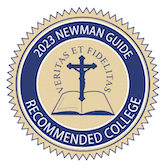Professor Joshua Hood, who teaches graduate and undergraduate Latin courses, recently earned his PhD in Semitics from The Catholic University of America. His dissertation was titled, “Songs of Supplication and Penitence: ʿOnyātā from the Warda Collection in Mingana Syr 214.”
“Onyātā are a type of stanzaic hymn used in the liturgies of the East Syriac tradition,” Dr. Hood explains, which is represented today by the Chaldean Catholic Church, the Assyrian Church of the East, the Ancient Church of the East, and some of the churches of India. Gīwargīs Wardā, who wrote most likely in the 13th century, authored many of these hymns as well as a liturgical book. “My dissertation examines those ʿonyātā appointed for the “Rogation of the Ninevites,” a three-day fast that occurs a few weeks before Lent,” Dr. Hood says. “In addition to a Syriac edition of the hymns and an English translation, I have tried to point out Wardā’s creative use of biblical narrative and the apocryphal and traditional stories that inform his retelling of biblical episodes. There are significant points of contact with Jewish and Islamic tradition as well,” he explains.
Professor Hood has studied many ancient and contemporary languages. “I was drawn to medieval Latin Catholicism as a teenager, and studying Latin in college was a natural first step in studying this,” he says. “I soon began studying Greek as well, and when I began graduate school at The Catholic University of America, my interests increasingly shifted ‘eastward’ as I moved from Biblical Studies to Semitics, concentrating in Syriac, but also studying Coptic, Arabic, and Hebrew.”
Subjects that particularly interest Dr. Hood include Eastern Christianity, Christian-Jewish-Islamic encounters throughout history, Christian apocrypha, and Syriac and Byzantine liturgy.





